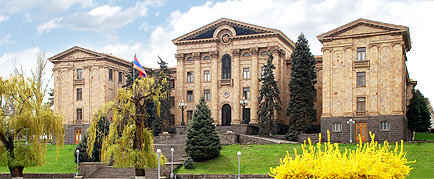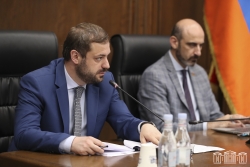There was one item on the agenda of the joint sitting of the Standing Committees on Financial-Credit and Budgetary Affairs and on Health Care of the RA National Assembly. The current conclusion of the Audit Chamber on the results of the audit of the budget expenditures conditioned by the new coronavirus pandemic (COVID-19) in the RA Ministry of Health was debated. It should be noted that no significant distortions and inconsistencies were recorded as a result of the audit, and the Audit Chamber did not consider it important to give a criminal-legal assessment in case of any problem.
At the beginning of the heated debate that lasted for more than three hours, the Chairman of the Audit Chamber Atom Janjughazyan drew attention to several points. First, he noted that the audit was conducted on the initiative of the National Assembly. The next observation was that the audit has not and will not answer the question of how satisfactory the results of the pandemic prevention and treatment process are, but how public finances were spent on achieving those results. According to Atom Janjughazyan, the Audit Chamber did not have appropriate capacity to answer the first question. He highlighted this adjustment in the context of formation of adequate expectations. The NA deputy, the former Minister of Health Arsen Torosyan agreed with the observation on the capacity of the Audit Chamber, however, he did not agree with a point of view expressed on the purpose of the audit. According to Torosyan, as stated in the audit, the purpose of the audit is to assess the process of fighting against the coronavirus. Arsen Torosyan also considered strange the fact that the member of the Chamber who coordinated this audit was not present at the debate. After the preliminary exchange of opinions, the key rapporteur of the issue, the Head of the Seventh Department of the Audit Chamber Khachik Papazyan presented that 26.5 billion AMD was allocated from the reserved fund of the Government aimed at the pandemic prevention and treatment in 2020. According to him, based on the sufficient evidence obtained within the framework of the audit, the group, conducting audit, concluded that adequate planning work was not carried out to prevent and treat the pandemic, no expenditure directions and non-financial outcome indicators were defined for the allocated funding, no accountability mechanisms were used in the decision-making process.
There were also discrepancies between the remuneration of professional staff in medical organizations per patient and the costs of medicines and medical products.
The deputy Gevorg Papoyan expressed an opinion that the audit gives the impression that nothing was done to fight against coronavirus. According to Papoyan, there are many allegations in the conclusion, which have been denied in the explanations given by the Ministry, but the auditors mainly did not accept them in a vague way? “Has any work been done? Has nothing good been done? After all, so many people have been treated, so much work has been done,” Papoyan asked, inquiring whether the international experience was studied, and which country had a strategy to prevent COVID-19 in 2019. In response to this observation, Atom Janjughazyan did not mention the name of any country. He again stressed that the purpose of the audit is not to give assessments of the result, but of the process.
The Minister of Health Anahit Avanesyan referred to the current conclusion of the Audit Chamber. She noted that the pandemic was new. It is comprehensive and very difficult to assess the results. The Ministry, working with the World Health Organization and the relevant structures in other countries, quickly formed a working group in 2020. Republican and interdepartmental plans for the coronavirus pandemic were developed, which were revised for three times. The Minister noted that according to the response of international organizations, clear mechanisms and actions were taken at the right time, which led to the management of the pandemic and the treatment of patients. The Minister reminded that in 2020, unlike many EU countries, there was no severe shortage of medicines, masks, concentrators in Armenia, and as a result of the investments made, it was possible to ensure fully security. Anahit Avanesyan noted that they do not accept those conclusions that distort the policy and results of the department during the whole process of fighting against the coronavirus pandemic.





